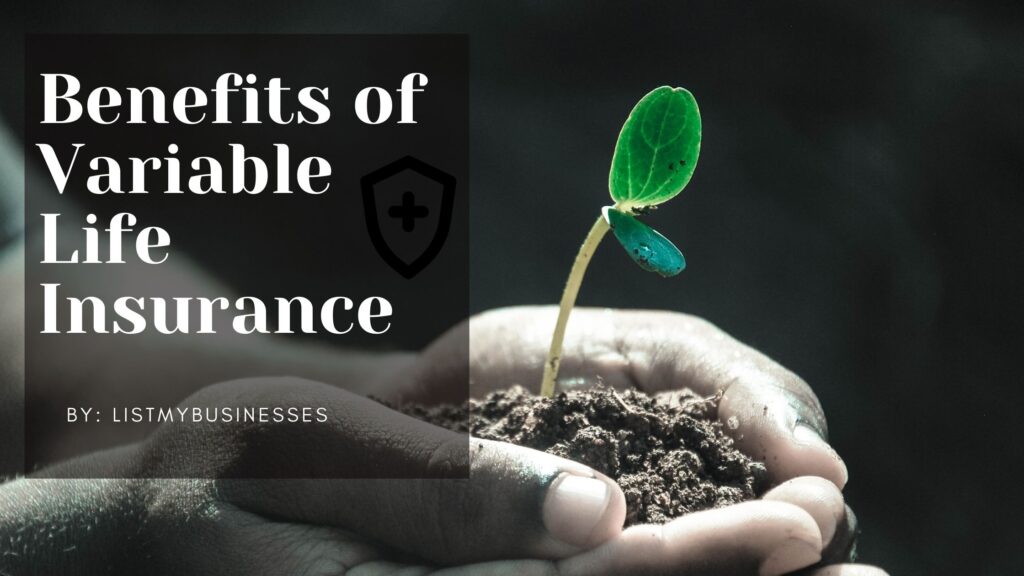Variable life insurance policies differ from traditional life insurance in that they offer the option to invest the premiums you pay on your policy over time rather than having them sit in the company’s cash reserve. This investment allows you to earn money off of your premiums, and it also protects your loved ones if you unexpectedly pass away before paying off the full amount of your premium.

Here are five benefits of variable life insurance policies you can choose to make use of if this type of policy makes sense for your needs.
Income protection
If you’re a business owner or a freelancer, it’s easy to take your salary for granted. But that income can disappear very quickly in case of an accident or long-term illness. Variable life insurance is one way to make sure that doesn’t happen. With variable life, you choose how much and what types of coverage you want (accident, critical illness and/or disability).
You decide what kind of premiums are affordable for your current financial situation and if there are any investment options that fit your risk tolerance. If something happens to you—and remember most people will eventually get sick or injured—you may find yourself with significantly less savings than anticipated.
Investment options
Variable policies are unique in that they’re often set up to provide investment options for policyholders. These investments can include savings accounts, mutual funds, government bonds and other securities, depending on what your policy offers.
Some policies will include a default option (for example, a savings account) while others will allow you to choose your own investment option or options. The beauty of a variable-policy investment is that it allows you to keep pace with market fluctuations while potentially earning more interest than typical bank products.
The biggest benefit? You could enjoy retirement benefits that far exceed those offered by traditional whole-life insurance policies.
Death benefit options
This type of policy offers flexible options for setting your death benefit. For example, with a typical policy, you can choose to have a lump sum paid out or to have your beneficiary receive a lifetime annuity that pays out a set amount monthly until their death. With some variable universal life policies, you can also take loans against your death benefit.
When considering which kind of life insurance is right for you, it’s important to think about what’s most important—if you don’t need or want flexibility in your coverage (or are nervous about losing value), then there are less expensive options available. But if these features sound appealing and they fit into your budget, they may be worth it.
Money for your family
Some people purchase Variable Life Insurance as an investment. Others purchase it as a way to leave money behind for their family when they die. In either case, it’s important to remember that a Variable Life policy is not an investment—it’s insurance. Don’t buy one if you’re in it for profit alone; instead, only purchase what you need for your lifestyle and financial goals.
If you expect there will be money left over at your death, you may want to consider buying more than what you need now; after all, Variable Life policies have inflation riders that allow them to increase in coverage at specified intervals (usually once per year). That way, if inflation goes up over time, so does your coverage.
Protection from creditors
Life insurance is great protection from creditors as it gives your dependents an income after you pass away to help pay off any debts they may have. Variable life insurance can be especially useful if you are worried about your heirs having to deal with a lot of debt after you die.
Your beneficiary will receive a large lump sum payment when you pass away and can use that money to pay off any outstanding debt or start saving for their future. It’s one way to make sure your family is taken care of, even if something unexpected happens to you. You don’t have to leave them responsible for paying bills alone.
The tax-free growth potential: You need not worry about taxes taking away money intended for your loved ones during end-of-life planning because variable life insurance does not recognize death as a taxable event.
By investing in variable life policies before death, you allow tax-free gains to accumulate over time so your beneficiaries won’t see their inheritances hit by estate taxes either upon inheritance or at distribution (if funds are invested back into another policy).
That’s why variable life is often preferred by small business owners who want to attract top executives—tax advantages build up over years of premiums contributed and then paid out over time in one big package on death so there’s no extra taxation due at payout time.
Conclusion
In short, variable life insurance offers several potential advantages over traditional term life, making it a useful and interesting choice for many people. Still, it’s important to weigh your options before purchasing a policy. Make sure you do your research and ask plenty of questions to ensure that you get exactly what you need from your policy. Shop around; don’t accept someone else’s first price without putting some time into comparison shopping. In most cases, shopping for an appropriate policy will prove worthwhile in both financial and emotional terms.